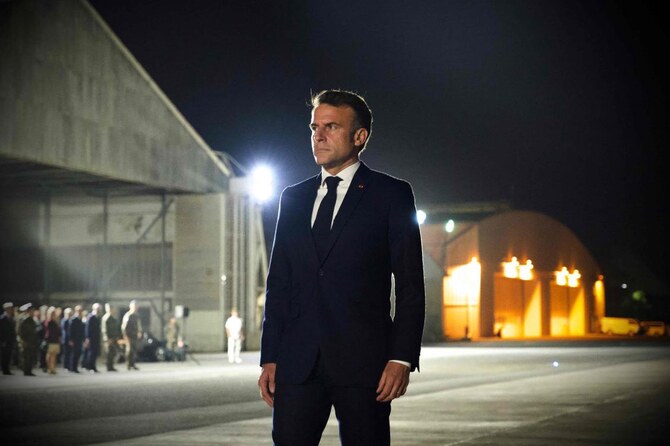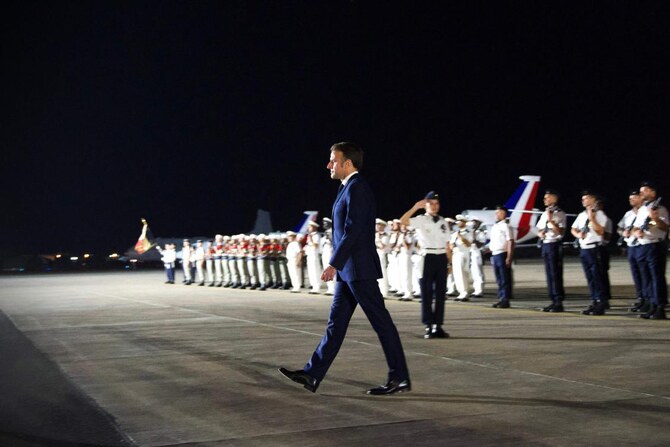DJIBOUTI: French President Emmanuel Macron said Friday its military base in Djibouti could assume a greater role, speaking after Paris was forced to pull troops out of several other African countries.
“Our role is changing in Africa because the world is changing in Africa, because public opinion is changing, because governments are changing,” he said.
Macron was addressing French forces stationed at the strategic Horn of Africa nation before sitting down for a Christmas meal with the troops, a regular feature on the presidential calendar.
France had to change its past logic of having too many military bases in Africa, he said.
In recent years, Mali, Burkina Faso and Niger, all three under military rule, have told France to get its troops out.
They have turned instead to Russia for military support in their fight against the jihadist forces active in the region.
And on Friday, France also began withdrawing ground troops from Chad, after N’Djamena last month abruptly ended military cooperation with the former colonial power.
The central African country was the last Sahel nation to host French troops.
Its decision also came shortly after Senegal’s President Bassirou Diomaye Faye told AFP in an interview that France should close its military bases there.
Djibouti has in the past been part of France’s Indo-Pacific strategy, contributing to freedom of navigation in the Red Sea.
“It is also, and will also have to be reinvented as, a projection point for some of our African missions,” Macron said, without elaborating.
The French base at Djibouti currently hosts 1,500 soldiers.
That makes it France’s largest military contingent abroad and the only one untouched by the military draw-down African nations have imposed on Paris.
In July, Djibouti and France renewed their defense cooperation treaty.
As well as paying rent for the base, France also assumes responsibility for patrolling the airspace over the country.
The small east African state is a relative haven of stability. On the other side of the Red Sea lies Yemen, gripped in a devastating civil war.
Macron sees new role for French military base in Djibouti
https://arab.news/n6uc3
Macron sees new role for French military base in Djibouti

- Macron was speaking after France was forced to pull troops out of several other African countries
WFP says has depleted all its food stocks in Gaza

- Entry of all humanitarian aid has been blocked by Israel since March 2
GAZA CITY, Palestinian Territories: The UN’s World Food Programme on Friday warned it has depleted all its food stocks in war-ravaged Gaza, where the entry of all humanitarian aid has been blocked by Israel since March 2.
“Today, WFP delivered its last remaining food stocks to hot meals kitchens in the Gaza Strip. These kitchens are expected to fully run out of food in the coming days,” WFP said in a statement.
Sudan violence ‘may amount to crimes against humanity’: UK

- Lammy called on the army and the paramilitary Rapid Support Forces (RSF) to “de-escalate urgently“
- “Last week, the UK gathered the international community in London to call for an end to the suffering of the Sudanese people”
LONDON: Violence in Sudan’s Darfur region shows “the hallmarks of ethnic cleansing and may amount to crimes against humanity,” UK foreign minister David Lammy said.
Lammy called on the army and the paramilitary Rapid Support Forces (RSF) to “de-escalate urgently” and said in a statement issued late Thursday that Britain would continue to “use all tools available to us to hold those responsible for atrocities to account.”
Paramilitary shelling of the besieged city of El-Fasher, the state capital of North Darfur, has killed more than 30 civilians and wounded dozens more, activists said on Monday.
El-Fasher is the last major city in the vast Darfur region that still remains in army control.
Lammy said that reports of the violence in and around El-Fasher were “appalling.”
“Last week, the UK gathered the international community in London to call for an end to the suffering of the Sudanese people.
“Yet some of the violence in Darfur has shown the hallmarks of ethnic cleansing and may amount to crimes against humanity,” he said.
He called on the RSF to “halt its siege of El-Fasher,” adding that “the warring parties have a responsibility to end this suffering.”
Lammy also urged the Sudanese Armed Forces to allow safe passage for civilians to reach safety.
International aid agencies have long warned that a full-scale RSF assault on El-Fasher could lead to devastating urban warfare and a new wave of mass displacement.
UNICEF has described the situation as “hell on earth” for at least 825,000 children trapped in and around El-Fasher.
Hundreds of Syrian Druze clerics head to Israel on pilgrimage

- Hundreds of clerics from Syria’s Druze minority on Friday are heading to Israel where they will conduct a pilgrimage to a sacred shrine, the second such visit since longtime ruler Bashar Assad’s
DAMASCUS: Hundreds of clerics from Syria’s Druze minority on Friday are heading to Israel where they will conduct a pilgrimage to a sacred shrine, the second such visit since longtime ruler Bashar Assad’s ouster.
The clerics from the esoteric, monotheistic faith, are to cross the border on foot, according to a Syrian official and a local news organization, despite Israel and Syria being technically at war.
The delegation will visit the Nabi Shuaib shrine in north Israel’s Galilee region, where an annual pilgrimage is held from April 25-28 each year.
Abu Yazan, the official from Hader on the Syrian Golan Heights, said that 400 clerics from his town and from the Damascus suburb of Jaramana will head to Israel after the Israeli authorities gave their approval.
Asking not to be identified by his full name, he said the trip was “purely religious” in nature.
Suwayda24, a news organization from nearby Sweida province, said some 150 Druze clerics from that area would also participate.
The group notified the Syrian government of its plan to go to Israel, though it received no response, the website added.
Unlike during a smaller visit to the shrine last month, the clerics will spend the night in Israel this time.
Abu Yazan, who is one of the participants, said that “we requested to stay for a week to visit the shrine” and other members of the religious community “but the Israeli side only authorized one night.”
The Druze are mainly divided between Syria, Israel and Lebanon.
They account for about three percent of Syria’s population and are heavily concentrated in the south.
Israel seized much of the strategic Golan Heights from Syria in a war in 1967, later annexing the area in 1981 in a move largely unrecognized by the international community.
After Islamist-led forces ousted Assad in December, Israel carried out hundreds of air strikes on Syria and sent troops into the demilitarised buffer zone of the Golan.
Israeli authorities have also voiced support for Syria’s Druze and mistrust of the country’s new leaders.
In March, following a deadly clash between government-linked forces and Druze fighters in Jaramana, Israeli Defense Minister Israel Katz said his country would not allow Syria’s new rulers “to harm the Druze.”
Druze leaders rejected the warning and declared their loyalty to a united Syria.
Rescuers say death toll from Israeli strike on north Gaza home rises to 23

- Gaza’s civil defense agency reported on Friday that the death toll from an Israeli air strike the day before on a house in the north of the Palestinian territory had risen to 23
- Gaza’s northern area of Jabalia has repeatedly been a focus Israel’s military offensive
GAZA CITY: Gaza’s civil defense agency reported on Friday that the death toll from an Israeli air strike the day before on a house in the north of the Palestinian territory had risen to 23.
“Civil defense teams recovered 11 bodies last night and this morning following the Israeli bombing that targeted a residential house ... in Jabalia,” Mohammed Al-Mughayyir, an official with the agency, told AFP.
“This is in addition to the 12 victims recovered at the time of the attack yesterday,” he added.
Gaza’s northern area of Jabalia has repeatedly been a focus Israel’s military offensive since the start of the war on October 7, 2023 following Hamas’s attack on Israel.
The military has returned to the district several times after announcing it had been cleared of militants, saying Hamas fighters had regrouped there.
In another strike in the area on Thursday, Israel hit what was previously a police station, rescuers said.
The toll from that attack has risen to 11, Mughayyir said, after initially announcing that nine people had been killed.
The military said on Thursday that it had struck a Hamas “command and control center” in the area of Jabalia, without specifying the target.
Israeli strikes continued on Friday, with the civil defense agency reporting that at least five people — a couple and their three children — had been killed when their tent was struck in the Al-Mawasi area of the southern city of Khan Yunis.
Agency spokesman Mahmud Bassal said that the deceased woman had been pregnant.
Since Israel resumed its offensive on March 18 after the collapse of a two-month ceasefire with Hamas, at least 1,978 people have been killed in Gaza, bringing the overall death toll of the war to 51,355, according to the Hamas-run territory’s health ministry.
UN voices concern over latest South Sudan clashes as civilians flee

- The United Nations agency warns that it may have to reduce the number of people it can help across the country, from May, if more funding does not come through from donors
GENEVA: The United Nations said Friday it was "deeply concerned" by clashes between South Sudan's military and opposition forces in a southern state, where displaced civilians told AFP they had been left without food.
The world's youngest nation, which is deeply impoverished, has long been troubled by insecurity and instability.
But recent fighting between factions allied to President Salva Kiir and his long-time rival Vice-President Riek Machar have sparked worries of renewed war.
International observers fear a return to the five-year civil war that cost some 400,000 lives and was ended by a 2018 peace deal which brought the two together in a unity government, but which appears to be unravelling.
Clashes between the South Sudan People's Defence Forces (SSPDF) and the Sudan People's Liberation Army-in Opposition (SPLA-IO) in neighbouring Morobo and Yei counties in Central Equatoria State "have led to civilian displacement and casualties", the United Nations Mission in South Sudan (UNMISS) said.
The state includes the capital, Juba, and under the 2018 agreement was split into areas controlled by government and opposition forces.
Pro-Machar forces denounced government attacks on a military cantonment in the area earlier this week, urging civilians to leave. The army did not comment.
The UN did not give further details of the clashes, but urged an "immediate cessation of hostilities", especially given the "already fragile political and security conditions".
Morobo County Commissioner Charles Data Bullen said the situation in the area "remains volatile".
Margret Ileli, 28, said she heard gunshots nearby on Tuesday afternoon "and we started running leaving everything behind".
She was now sheltering in Morobo town but told AFP: "I am confused and I don't know what to do next."
Charles Likambo, 30, was also displaced with his family of five, telling AFP he was forced to abandon his crops and goats.
"Me and my family have not received any food assistance, and my children keep on crying because they are hungry," he said, urging humanitarian organisations to help.






















